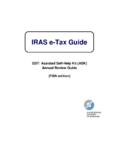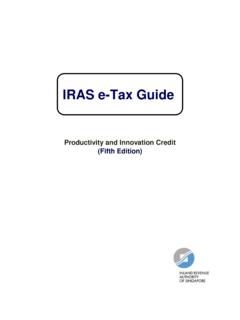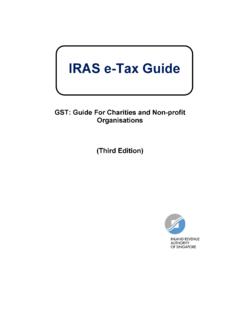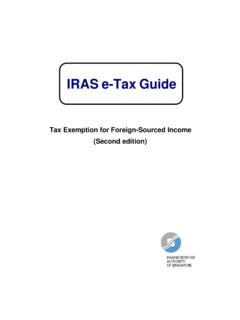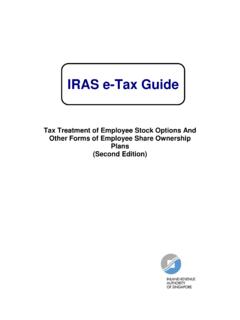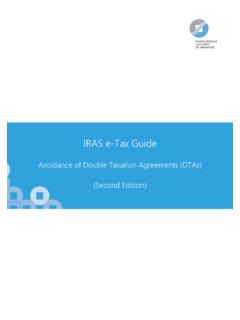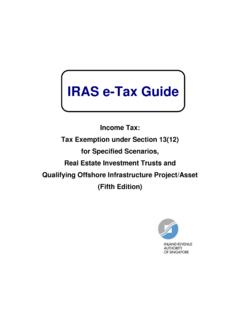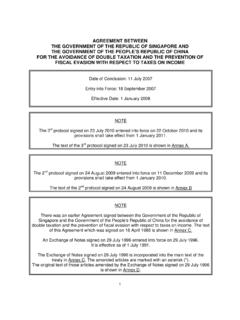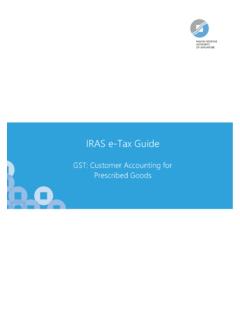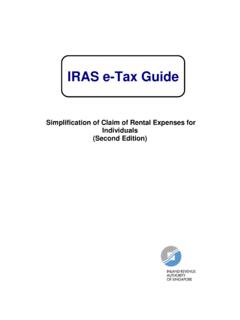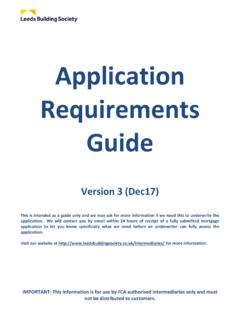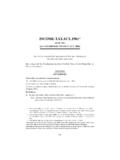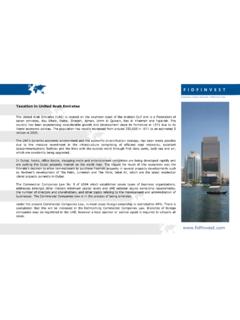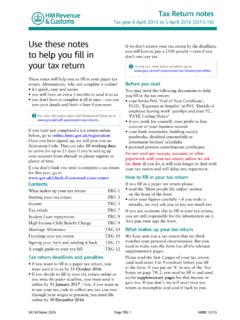Transcription of IRAS e-Tax Guide
1 Income Tax: Taxation of property Developers IRAS e-Tax Guide 2 Published by Inland Revenue Authority of Singapore Published on 6 March 2013 Disclaimers: IRAS shall not be responsible or held accountable in any way for any damage, loss or expense whatsoever, arising directly or indirectly from any inaccuracy or incompleteness in the Contents of this e-Tax Guide , or errors or omissions in the transmission of the Contents. IRAS shall not be responsible or held accountable in any way for any decision made or action taken by you or any third party in reliance upon the Contents in this e-Tax Guide .
2 This information aims to provide a better general understanding of taxpayers tax obligations and is not intended to comprehensively address all possible tax issues that may arise. While every effort has been made to ensure that this information is consistent with existing law and practice, should there be any changes, IRAS reserves the right to vary our position accordingly. Inland Revenue Authority of Singapore All rights reserved. No part of this publication may be reproduced or transmitted in any form or by any means, including photocopying and recording without the written permission of the copyright holder, application for which should be addressed to the publisher. Such written permission must also be obtained before any part of this publication is stored in a retrieval system of any nature. 3 Table of Contents 1 Aim .. 4 2 At a Glance.
3 4 3 Glossary of Terms .. 4 4 Date of commencement of property development business .. 5 5 Basis of recognition of taxable profit .. 5 6 Income accrued before and during development of lands/ properties .. 6 7 Expenses incurred before and during development of lands/ properties .. 6 8 Provision for diminution in value of land .. 7 9 Provision for warranty or defects liability .. 7 10 Provision for diminution in value of unsold properties of completed projects .. 7 11 Provision for liquidated damages for late completion .. 7 12 Provision for compensation for shortfall in floor area .. 8 13 Allocation of land and development cost for a mixed-use development project .. 8 14 Sale of land/ uncompleted development project .. 10 15 Letting out of unsold properties .. 10 16 Related party transactions .. 10 17 Intention for long-term investment .. 11 18 Single-project concession for property development companies.
4 12 Scope .. 12 Application of the concession .. 13 Conditions governing the application of the concession .. 14 A) Shareholding test .. 14 B) Interaction of the concession with carry-back relief and group relief systems .. 14 Revocation of the Concession .. 14 Administrative 15 Transitional rules for property development companies granted existing one-project concession previously .. 15 Frequently asked questions .. 15 19 Contact information .. 15 Annex 1 Overview of the single-project concession for property development companies .. 16 Annex 2 Illustration on application of the single-project concession .. 17 Annex 3 Transitional rules for property development companies granted one-project concession previously .. 19 Annex 4 Frequently asked questions .. 20 4 TAXATION OF property DEVELOPERS 1 Aim This e-Tax Guide sets out the tax treatments for transactions carried out by property developers.
5 This e-Tax Guide is relevant to a company, a partnership or an individual that carries on property development activities (hereafter referred to as a property developer ). property development activities comprise the development of land parcels into residential, commercial and industrial properties for sale, usually prior to the completion of the properties. 2 At a Glance A typical property development cycle starts with the property developer acquiring a land parcel, obtaining government approvals, financing, designing, awarding the construction contracts to various contractors and marketing the property units for sale prior to completion. A property development project can be wholly for residential, commercial or industrial purpose or for mixed-use. This Guide provides the tax treatment on the accounting of property sales and other revenues of a property developer and the deductibility of development and related expenses and updates on the administrative concession relating to a single-project company.
6 3 Glossary of Terms Development Cost Account All costs directly attributable to the property development project are capitalised in the Development Cost Account. The cost items capitalised include cost of land, cost of site preparation, construction cost, financing cost, development charge and property tax. Temporary Occupation Permit ( TOP ) A TOP is issued by the Commissioner of Building Control when building works are completed. It signifies that the completed building or part thereof can be occupied. 5 4 Date of commencement of property development business Based on case law1, a property developer is prima facie carrying on the business of property development for sale (hereafter referred to as prima facie position). Hence, any land/ property acquired is for development for sale and the date of acquisition is regarded as the date of commencement of its property development business2.
7 5 Basis of recognition of taxable profit For tax purposes, the profits of a property development project are recognised when the project is substantially completed, when the TOP is issued, regardless of the revenue recognition method adopted for accounting purposes. In the TOP Year of Assessment ( YA )3, the sale proceeds due and payable in accordance with the payment schedule in the Sale and Purchase Agreement of the property units sold are taxed. The allowable development costs incurred up to that date on these units are allowed as deduction. If some property units are not sold by TOP YA, the allowable development costs to be allowed as deduction in the TOP YA have to be apportioned (see example in Box). A company developed 100 residential units (total floor area of 15,000 sq m) for sale. TOP was obtained on Allowable development costs incurred up to was $75m.
8 As at , 80 units (total floor area of 13,000 sq m) were sold. The company s accounting year end is 31st December. As the TOP was obtained on , the profit from sale of 80 units would be taxed in YA 2013 and computed as follows: YA 2013 (basis period: to ) Sale proceeds of 80 units $78m (based on payment schedule in the Sale & Purchase Agreement) Less: Allowable development costs of the 80 units 13,000 sq m x $75m $65m 15,000 sq m -------- Profit from sale of 80 units $13m -------- The balance of allowable development costs of $10m ( $75m less $65m) attributable to the remaining 20 unsold units would be carried forward and allowed as deduction upon their sale subsequently. 1 Mount Elizabeth (Pte) Ltd v CIT [1986] SGHC 35. 2 Refer to details in e-Tax Guide on Determination of the Date of Commencement of Business published on 12 Dec 2008.
9 3 TOP YA refers to the year of assessment in which TOP is issued. 6 6 Income accrued before and during development of lands/ properties A property developer may receive certain income from the lands/ properties acquired ( en-bloc purchase) before and during their development. The tax treatments of these incomes are as follows:- Income Tax treatment a) Compensation/ liquidated damages from vendors for late completion of purchase of lands/ properties Taxed upfront on due basis under section 10(1)(a) of Income Tax Act b) Compensation/ liquidated damages from contractors for late completion of construction c) Interest/ penalty from purchasers for late payment of sale proceeds d) Forfeiture of booking fee for abortive sale from purchasers e) Rental income (net of revenue expenses wholly and exclusively incurred to earn rental income) derived from the lands/ properties acquired pending development for sale.
10 F) Interest income from temporary placement of excess funds of the property developer s Project Account in short-term deposits Set-off against development cost in the Development Cost Account 7 Expenses incurred before and during development of lands/ properties Expenses that are directly attributable to the acquisition of land and property development activities are to be capitalised and accumulated in the Development Cost Account up to the TOP YA. Where there is more than one development project or there are different phases in a development project, a separate Development Cost Account for each project or each phase of a project has to be submitted together with the income tax return. The following adjustments must be made to the Development Cost Account to arrive at the allowable development costs for each YA: Items to be excluded from the Development Cost Account Non-deductible costs such as private expenses; Marketing and promotional expenses as they are deductible in the year in which they are incurred; 7 Items to be added to the Development Cost Account Expenses charged to the profit and loss accounts prior to TOP date but are attributable to the development project such as interest expenses and property tax.
